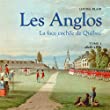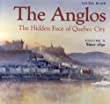-
-
2005-., Éditions Sylvain Harvey Call No: QWF FR SC 971.4471 B635a Availability:1 of 1 At Your Library
-
-
c2005., Commissionde la capitale nationale du Québec Call No: QWF SC 971.4471 B635a v.2 Availability:1 of 1 At Your Library
-
-
2015., Adult, Patrick Crean Editions Call No: SC 971.004 M146c Availability:1 of 1 At Your Library Summary Note: "More than nine million Canadians claim Scottish or Irish heritage. Did the ancestors of more than one quarter of our population arrive without cultural baggage? No history, no values, no vision? Impossible. McGoogan writes that, to understand who we are and where we are going, Canadians must look to cultural genealogy. Scottish and Irish immigrants arrived in Canada with values they had learned from their forebears. And they did so early enough, and in sufficient numbers, to shape an emerging Canadian nation. McGoogan highlights five of the values they imported as foundational: independence, audacity, democracy, pluralism and perseverance. He shows that these values are thriving in contemporary Canada, and traces their evolution through the lives of thirty prominent individuals -- heroes, rebels, poets, inventors, pirate queens -- who played formative roles in the histories of Scotland and Ireland. Two charged traditions came together and gave rise to a Canadian nation. That is when Celtic lightning struck"--Provided by publisher.
-
-
-- Making of Canada.2019., Adult, HarperCollins Publisher Ltd Call No: SC 971.00491 M146f Edition: First edition. Availability:1 of 1 At Your Library Summary Note: Bestselling author Ken McGoogan tells the story of those courageous Scots who, ruthlessly evicted from their ancestral homelands, were sent to Canada in coffin ships, where they would battle hardship, hunger and even murderous persecution. After the Scottish Highlanders were decimated at the 1746 Battle of Culloden, the British government banned kilts and bagpipes and set out to destroy a clan system that for centuries had sustained a culture, a language and a unique way of life. The Clearances, or forcible evictions, began when landlords--among them traitorous clan chieftains--realized they could increase their incomes dramatically by driving out tenant farmers and dedicating their estates to sheep. Flight of the Highlanders: The Making of Canada intertwines two main narratives. The first is that of the Clearances themselves, during which some 200,000 Highlanders were driven--some of them burned out, others beaten unconscious--from lands occupied by their forefathers for hundreds of years. The second narrative focuses on resettlement. The refugees, frequently misled by false promises, battled impossible conditions wherever they arrived, from the forests of Nova Scotia to the winter barrens of northern Manitoba. Between the 1770s and the 1880s, tens of thousands of dispossessed and destitute Highlanders crossed the Atlantic --prototypes for the refugees we see arriving today from around the world. If today Canada is more welcoming to newcomers than most countries, it is at least partly because of the lingering influence of those unbreakable refugees. Together with their better-off brethren--the lawyers, educators, politicians and businessmen--those indomitable Highlanders were the making of Canada.
-
-
2010., Harper Collins Call No: SC 971.004 M146h Availability:1 of 1 At Your Library Summary Note: No matter where you enter the history of Canada through exploration, politics, business, education or literature -- you find that the Scots and their descendants have played a leading role. Today, almost five million Canadians identify themselves as Scottish, and their influence is felt throughout the land. Starting with his own deep roots in Scotland and early Canada, Ken McGoogan has created a lively, entertaining narrative that focuses on more than sixty Scots who have led the way in shaping this country.Early arrivals included explorers Alexander Mackenzie, Simon Fraser and the Scotch West Indian,· James Douglas. Later, Scots such as Lord Selkirk and John Galt encouraged thousands to immigrate. Nation-builders followed, among them John A. Macdonald, James McGill and the reformer Nellie McClung. Then came the visionaries, Scottish Canadians such as Tommy Douglas, Doris Anderson and Marshall McLuhan, who have turned Canada into a nation that revels in diversity. McGoogan commemorates the first settlers to land at Pictou, Nova Scotia, and celebrates such hybrid Canadians as the Cherokee Scot John Norton, Thérèse MacDonald Casgrain and the kilt-loving John George Diefenbaker. He honours the war contributions of Scottish Canadian regiments, and he toasts Sir Walter Scott and the beloved Robbie Burns. Beautifully illustrated and handsomely packaged, How the Scots Invented Canada is an exuberant celebration of the building of a nation.
-
-
2019., McGill-Queen's Universitry Press Call No: SC QWF 919.804 R827h Availability:1 of 1 At Your Library Summary Note: Summary/Review: "Captains of whaling vessels were experienced navigators of northern waters, and William Penny was in the vanguard of the whaling fraternity. Leading the first maritime expedition in search of Sir John Franklin, he stood out not just for his skill as a sailor but for his curiosity about northern geography and his willingness to seek out Inuit testimony to map uncharted territory. Hunters on the Track describes and analyzes the efforts made by the Scottish whaling master to locate Franklin’s missing expedition. Bookended by an account of Penny’s whaling career, including the rediscovery of Cumberland Sound, which would play a vital role in British whaling a decade later, W. Gillies Ross provides an in-depth history of the first Franklin searches. He reconstructs the brief but frenetic period when the English-speaking world was preoccupied with locating Franklin, but when the means of that search--the ships chosen, the route taken, the evidence of Franklin’s traces--were contested and uncertain. Ross details the particularities of each search at a time when no fewer than eight ships comprising four search expeditions were attempting to find Franklin’s tracks. Reconstructing events, relationships, and decisions, he focuses on the work of Penny as commander of HMS Lady Franklin and Sophia, while also outlining the events of other expeditions and interactions among the officers and crews. William Penny is respected as one of the most influential and innovative figures in British Arctic whaling history, but his brief role in the Franklin expedition is less known. Using primary sources, notably private journals from each of the expeditions, Hunters on the Track places him at the forefront of a critical chapter of maritime history and the geographical exploration that began after Franklin disappeared."--.
-
-
1976., McCord Museum, McGill University : McGill-Queen's University Press Call No: SC 796.0971 I31i Availability:1 of 1 At Your Library
-
-
c2013., McGill-Queen's University Press Call No: SC IND 325.3 M889i Availability:1 of 1 At Your Library Summary Note: The expansion of the British Empire during the eighteenth and nineteenth centuries created the greatest mass migration in human history, in which the Irish and Scots played a central, complex, and controversial role. The essays in this volume explore the diverse encounters Irish and Scottish migrants had with Indigenous peoples in North America and Australasia. The Irish and Scots were among the most active and enthusiastic participants in what one contributor describes as "the greatest single period of land theft, cultural pillage, and casual genocide in world history." At the same time, some settlers attempted to understand Indigenous society rather than destroy it, while others incorporated a romanticized view of Natives into a radical critique of European society, and others still empathized with Natives as fellow victims of imperialism. These essays investigate the extent to which the condition of being Irish and Scottish affected settlers' attitudes to Indigenous peoples, and examine the political, social, religious, cultural, and economic dimensions of their interactions. Presenting a variety of viewpoints, the editors reach the provocative conclusion that the Scottish and Irish origins of settlers were less important in determining attitudes and behaviour than were the specific circumstances in which those settlers found themselves at different times and places in North America, Australia and New Zealand.
-
-
c2017., [s.n.] Call No: SC 971.428 B442m Availability:1 of 1 At Your Library Summary Note: details a magical period in the history of Montreal, Quebec and Canada. From the 1860œs to the 1930œs Montrealœs Merchant Princes built their grand estates at the foot of Mount Royal overlooking the city. From this unique neighborhood these residents presided over a social, commercial and industrial renaissance that joined a nation from coast to coast. The collective contribution of these families to the establishment and development of Canada is nothing less than remarkable. MONTREALœS GOLDEN SQUARE MILE A NEIGHBORHOOD highlights Montrealœs social and corporate heritage as one of the most significant contributions in the history of Canadaœs development. A Literary and photographic retrospective elaborating on the individual and family contributions to the building of a nation this volume features more than 600 historical images including over 350 images by Canadian photographic pioneer William Notman, the largest print publication of his work to date.
-
-
2006., McGill-Queen's University Press Call No: SC QWF Bio P296p Availability:2 of 2 At Your Library Series Title: Footprints (Montréal, Québec)
-
-
-- Sir John A. Macdonald, his life, our times :c2011., General, Random House Canada Call No: SC Bio M135gw vol.2 Availability:1 of 1 At Your Library






















